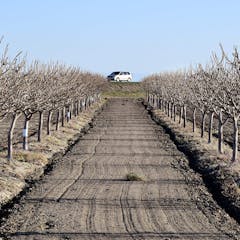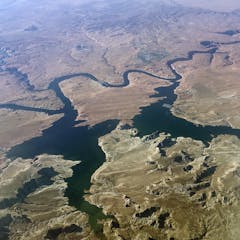
Articles on California
Displaying 101 - 120 of 281 articles

‘Local, organic, sustainable’ are common buzzwords on US restaurant menus now, but it wasn’t always that way. Alice Waters and her restaurant, Chez Panisse, helped put them there.

Without enough water, trees can develop embolisms, similar to blockages in human blood vessels, and they’re more likely to die from drought or fires.

Satellites can already spot a new fire within minutes, but the information they beam back to Earth isn’t getting to everyone who needs it or used as well as it could be.

Photos from the early 1900s show LA’s forests of oil derricks. Hundreds of wells are still pumping, and new research finds people living nearby are struggling with breathing problems.

The US has one of the highest groundwater use rates in the world. When wells run dry, households may opt to conserve water, find new sources or sell and move.

Installing solar panels over California’s 4,000 miles of canals could generate less expensive, renewable energy, save water, fight climate change – and offer a solution for the thirsty American West.

The Supreme Court recently dealt defeat to Florida in its 20-year legal battle with Georgia over river water. Other interstate water contests loom, but there are no sure winners in these lawsuits.

The world’s first futures market for water launched in California in December. Two commodities experts explain how it works, what the potential problems are and why there’s no reason to freak out.

Making biofuels from crops grown on land poses trade-offs between food and fuel. A new study looks offshore.

Cities have long resisted the public demand for street food vendors, but the pandemic may reverse those restrictions for good.

Heat waves, droughts and deep freezes can all strain the electric grid, leading utilities to impose rolling blackouts. Climate change is likely to make these events more common.

Electric cars get a lot of hype, but what really matters for the climate are excess emissions from the many millions of gasoline vehicles still sold each year.

States and hospitals are starting to declare ‘crisis standards of care’ as the pandemic floods their ERs. The orders have consequences – both good and bad, as a medical ethicist explains.

The curator at UC Merced describes the evacuation and shows a selection of photographs from the 110-year history of the park.

Not having enough to eat is a major public health concern, not only because it causes hunger and distress, but also because it’s linked to poor nutrition and unstable diet patterns.

Proposition 22 keeps workers for app-based companies like Uber and Lyft classified as independent contractors, but it also reveals deeper problems with contemporary labour markets.

A fire scientist offers a six-point strategy for preventing wildfires and living safely in flammable landscapes.

California was thought to be an exception, a place where oil field operations and tectonic faults apparently coexisted without much problem. Not any more.

The debate over how to classify gig workers pits flexibility against the higher incomes and benefits that come with being classified as an employee.

Workers say they love the freedom of platforms like Uber and TaskRabbit but find it hard to earn a livable wage. Cooperatives that give worker-owners a voice in how they are run offer a solution.
